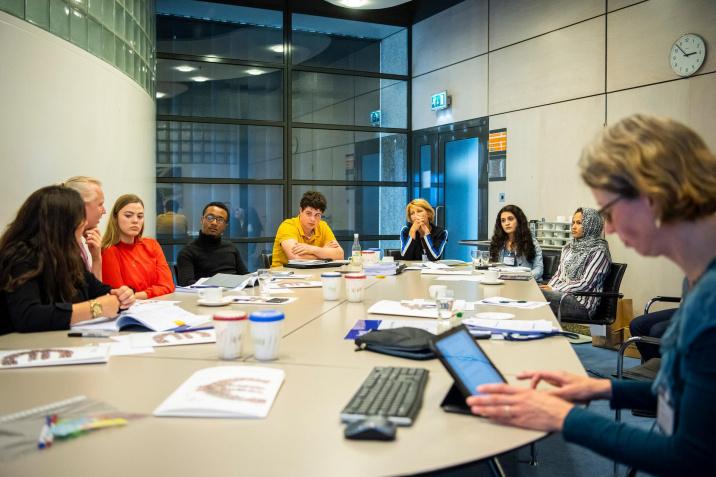100 Students scrutinise government policy
On Tuesday, 20 May 2019, 100 students from colleges of further education all over the Netherlands came to the House of Representatives today for the annual V-100. This is a citizens’ panel which sits once a year to scrutinise the accountability documents issued by the various ministries in The Hague and to formulate critical questions about government policy. This is the third time that the House has organised a V-100 session.

The V-100 gathering followed the presentation to the House of Representatives on Accountability Day, 15 May, of the central government’s 2018 Annual Report (incorporating individual ministerial reports) and Annual Financial Report. These reveal how the ministries have put their policy plans into practice.
Themes
The students received help from MPs in drafting their questions. Five themes were selected from the reports.
- Opportunities in the Labour Market (Social Affairs and Employment, Education, Culture and Science)
- The Housing Market (Interior and Kingdom Relations)
- Boundless Vocational Further Education (Education, Culture and Science)
- Investing in Security (Justice and Security)
- Care for the Elderly and in Nursing Homes (Health, Welfare and Sport)
Divided into groups, the young panellists formulated specific questions they would like the relevant ministers to answer. For example, the Boundless Vocational Further Education group wanted to know why the percentage of students in vocational higher education taking a placement abroad is much bigger than the equivalent figure in vocational FE (23.8% versus 7.6%). They also asked that more be done for young people with disabilities wanting to gain experience abroad. Of the six questions considered by the group, two were ultimately selected. One of these read as follows:
“There are all kinds of arrangements for students who want to do a placement abroad, such as the Erasmus Scholarships. But FE students are insufficiently familiar with these. How can you ensure that these schemes become better known to students in general, and to students with disabilities in particular? And how are you going to ensure that colleges provide students with enough information about them?”
Briefcase
At the end of the afternoon, the President of the House of Representatives, Khadija Arib, arrived to receive the students’ questions. To her great surprise, she was greeted with applause. “I never have MPs clapping for me as President,” she joked. The questions were presented in a despatch box specially designed for the occasion by student Thijmen from Cibap, a vocational college for the creative arts in Zwolle. “What a beautiful box,” Arib commented. “And very smart of you to look not just at the content, but also the form.”
In her speech to the assembled panellists, the President emphasised how important it is for young people to be socially engaged. “We are talking here today about issues which affect you all: employment, healthcare and the housing market. You have asked incredibly good questions.”
Arib also took the time to answer some personal questions. For example, one student wanted to know whether she was ever bored by politics. “No,” she replied. “I always say to myself: it’s a good thing that we’re discussing this topic here.” The President also reminded her audience that she had once been a student in vocational further education herself, so she was very proud of everyone in that sector. “You are the foundation in education,” she declared. “The link between theory and practice.”
Accountability debate
The House of Representatives will hold its annual accountability debate on thursday 6 June 2019, to discuss the government’s annual reports with Prime Minister Mark Rutte and Finance Minister Wopke Hoekstra. A number of the students’ questions will also be raised.